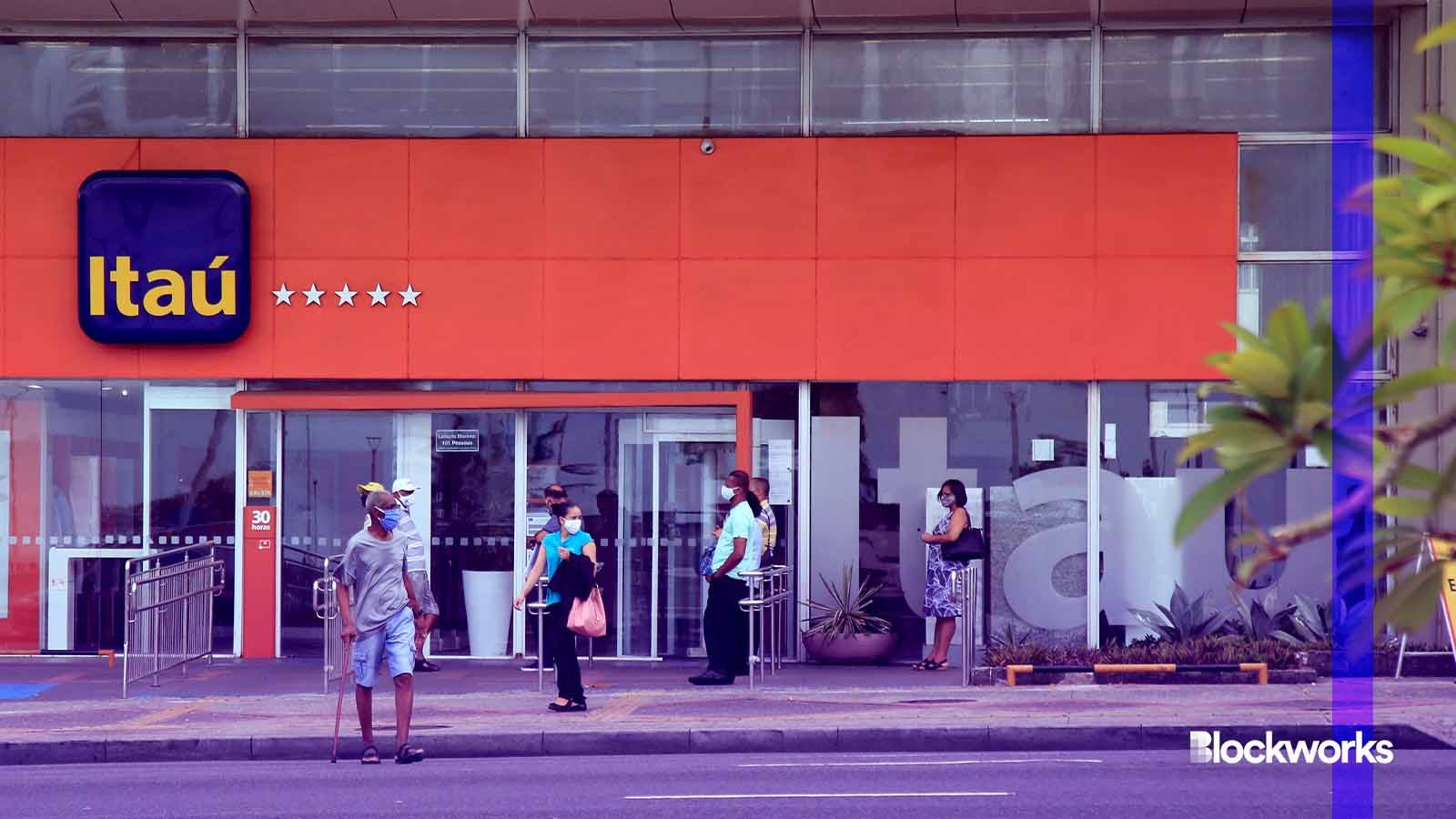How a Brazilian banking giant’s latest move reflects the ongoing TradFi-crypto convergence
Amid moves by Itau Unibanco and Nubank, the country could serve as “a proof of concept” for TradFi-crypto integrations, industry research exec says

Joa Souza/Shutterstock modified by Blockworks
As traditional finance players continue wading deeper into the crypto space, Brazil could serve as a “proof of concept” for such integrations.
Brazil bank Itau Unibanco launched crypto trading, Reuters reported Monday. A spokesperson for the company did not immediately return a request for comment.
The reported move signals “a clear demand from clients” and marks the ongoing crypto initiatives by major banks in the country, said Pedro Lapenta, head of research at crypto asset manager Hashdex.
Nubank, for example, launched crypto trading in May 2022 — adding access to polkadot (DOT), avalanche (AVAX), stella lumens (XLM), arbitrum (ARB) and optimism (OP) last month. The company partnered with stablecoin issuer Circle Tuesday to extend USDC exposure to Brazilian Nubank customers.
“To anticipate how the convergence of traditional and crypto markets will unfold, it seems appropriate to consider Brazil as one of the most advanced countries, and perhaps the primary case to observe in the next one to two years,” Lapenta told Blockworks.
Read more: TradFi, DeFi convergence continues through tokenizing real-world assets
He noted the Brazil central bank’s efforts in developing its Digital Brazilian Real, or Drex.
The country’s securities regulator in 2021 approved Brazil’s first bitcoin ETF — a type of fund the US Securities and Exchange Commission has never allowed to come to market.
“It is reasonable to envision that, similar to the way we observed with the Pix in the payment sector, Brazil could serve as a proof of concept for the seamless integration between traditional finance and crypto, potentially offering valuable insights for the global economy,” Lapenta added.
Itau Unibanco’s trading service is initially set to be limited to bitcoin and ether, Reuters reported.
Rather than trying to compete with centralized exchanges such as Binance, Itau is likely more focused on adding an extra option for existing clients, market observers said.
Reflecting a broader theme
The new way to trade crypto in Brazil reflects a broader trend gaining steam globally.
“Itau Unibanco launching crypto trading and custody services confirms the thesis we have had throughout 2023: Traditional organizations are building the rails to enter the digital asset ecosystem, right now,” said Caspar Sauter, co-founder of decentralized exchange D8X. “From Brazil to Switzerland, we have seen multiple banks entering the space over the last months.”
Switzerland-based St.Galler Kantonalbank launched bitcoin and ether custody and trading services to certain clients via a link-up with AMINA Bank (formerly known as SEBA Bank).
Sauter noted that he expects more traditional banks to start offering crypto-related services, with a focus first on custody and trading.
“Instead of developing in-house solutions, they will leverage white-label products offered by players such as Amina Bank, Sygnum Bank or AlphaPoint,” he told Blockworks. “Ultimately those banks will also build rails to the DeFi ecosystem, which is what we at D8X are banking on.”
Sauter said large banks in Europe will follow soon, but added those in the US could lag behind considering the country’s current regulatory environment.
Still, some have already taken steps.
Germany-based Deutsche Bank said in September it was set to establish digital asset custody and tokenization services by teaming up with crypto infrastructure firm Taurus.
In the US, financial services giant Fidelity Investments launched a crypto trading product for retail investors in 2022. The country’s oldest bank, BNY Mellon, has expressed its long-term focus on digital innovation.
JPMorgan has explored various tokenization and blockchain initiatives for several years — recently facilitating a collateral transaction between BlackRock and Barclays via a decentralized application.
“We maintain a positive outlook on the consistent trend of [traditional finance] incorporating crypto and blockchain technology into their products and infrastructure,” Lapenta said. “We’re also cautiously optimistic about how this movement will eventually translate into positive price action in the crypto market.”
Bitcoin’s (BTC) price was roughly $43,750 at 4 pm ET Tuesday — about 14% higher than seven days ago and up nearly 5% in the last 24 hours.
Get the news in your inbox. Explore Blockworks newsletters:
- The Breakdown: Decoding crypto and the markets. Daily.
- 0xResearch: Alpha in your inbox. Think like an analyst.






